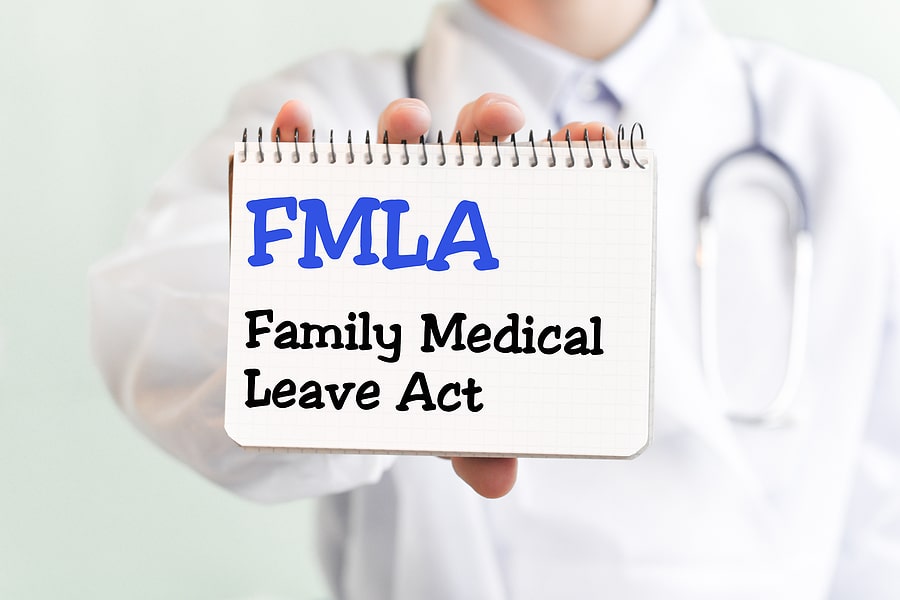The Family and Medical Leave Act, also known as FMLA, was established to protect workers who might encounter situations that require them to leave work to attend to personal or family needs that surpass their ability to continue their employment. FMLA leave is not permanent but rather allows employees to take time off in particular situations. In this article, we’ll cover the instances in which you may take FMLA leave and your rights when doing so.
What can you use FMLA for?
- Family
- Health
- Birth
If You Work for a Covered Employer, Your Group Healthcare Benefits Must Continue
According to the United States Department of Labor, the FMLA entitles employees who work for covered employers to take job-protected, unpaid leave that the FMLA specifies that are related to the medical needs of your family or yourself, and other events such as a new child joining the family. When you are away from work under FMLA-covered leave, your covered employer is required to allow you to continue your group health insurance coverage under the same terms and conditions if you had not used FMLA leave to attend to a personal or family situation covered under the FMLA.
Your Employer Must Allow You to Return to Your Job
When working for a covered employer, the primary benefit of FMLA is your capacity to maintain your health insurance coverage while away during a potentially life-threatening situation. Your work insurance will protect your health and that of your loved ones, which could mean the difference between life and death or financial stability and bankruptcy. An additional key benefit is that your employer must hold your job for you.
The duration of covered FMLA leave is 12 weeks, nearly three months. As noted by the Employment Development Department of California, the FMLA enables you to attend to your or a family member’s serious health conditions or bond with a new child in your family. How to add a new member covered under the FMLA varies.
Your New Child in Your Family Can Be Born, Adopted, or Fostered
It is important to note that FMLA covers you when your family has had a new child. FMLA does not confine the term “new child” to only instances in which there has been a newborn in your family. According to the Department of Labor, the FMLA covers bonding with a new child—not only a newborn but also an adopted child. Families that foster a child may take FMLA leave, but only during the first year of a placement of a foster child in your family’s home.
The CFRA Provides You With Additional Protections if Your Employer Is in California
The CFRA is the California Family Rights Act, which according to the Employment Development Department of the State of California, works in conjunction with the FMLA to protect the rights of workers when they or their families encounter a situation of change or health challenge. You may take the leave to care for yourself or a family member, to bond with a new child, or to participate in a qualifying event due to a family member’s military deployment overseas.
You Must Meet Specific Criteria to Qualify for FMLA/CFRA
For an employee to qualify for FMLA, they must meet particular criteria. The employee must have worked for at least 12 months for a covered employer. During that time, they must have worked 1,250 hours in the 12 months before the start of FMLA leave. Under the FMLA, the employee also must work at a worksite with more than 50 employees under the employer’s employment within 50 miles of that particular worksite.
FMLA covers private employers who have over 50 employees on the payroll during any 20 or more calendar weeks in the current or preceding calendar year. All public employers are covered by FMLA, regardless of the number of employees they have. Paid employees, unpaid, part-time, or on commission, are still generally covered by the FMLA if they meet the other necessary criteria for qualification.
The requirements to meet FMLA can be challenging to understand in some circumstances. An experienced attorney can help you understand your rights and options if your employer does not respect your rights.
Family Medical Leave Act FAQs
What does FMLA stand for?
FMLA stands for the Family and Medical Leave Act, established by the government to protect workers’ rights in times of change or health challenges in their families.
For what purposes can I use FMLA?
The key purposes of FMLA are health, family, and children, meaning you may take it if there is a serious health problem with yourself or a family member, or you’ve added a child through your home through birth, adoption, or fostering.
How long does FMLA-covered leave last?
FMLA-covered leave lasts for up to 12 weeks, after which time you may return to your job.
What are the key benefits of FMLA leave concerning my job?
The key benefits of FMLA leave are that you may take up to 12 weeks of unpaid leave to care for yourself, your family, or a new child, and during that time, you may keep your group health insurance from your employer under the same terms, and your employer must return your job to you upon completion of the FMLA leave.
What are my options if my employer refuses to maintain my insurance or return my job?

If you have taken FMLA leave from a covered employer, and your rights are not being honored, a lawyer is a great advocate to protect your rights and determine your options for recovering damages.





